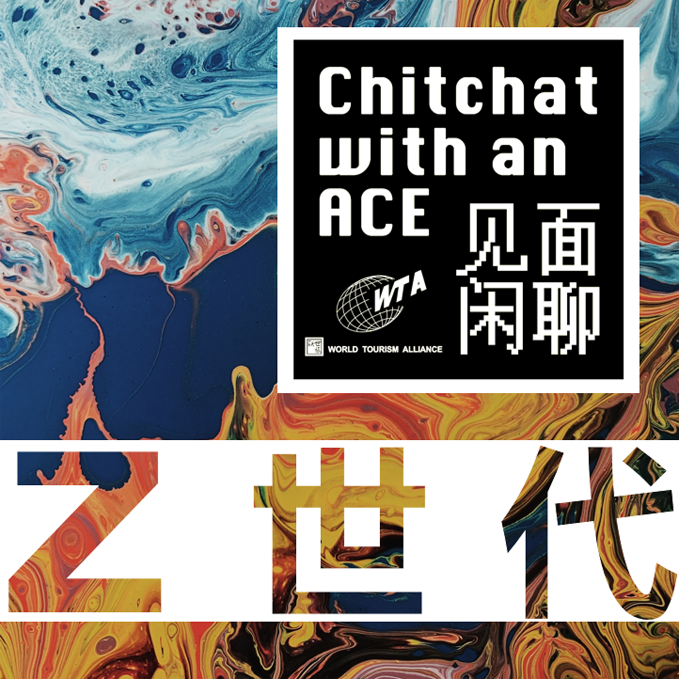2022-02-08
On the occasion of the Lunar New Year, we at WTA wish you a roaring Year of the Tiger filled with abundant good luck, good health, prosperity and happiness.
In this season of renewal, we want to bring something new to our Chitchat with an ACE. To kick off our season, we invite you to look back with us on some of the “trending words”that emerged in our culture and the tourism industry in the past year. Join us in exploring and finding out if these new concepts would gain greater foothold or evolve into something more meaningful and actionable in the new year to come.So, grab your cup of coffee and let’s talk!


Q1:Do you think Gen Z is a meaningful market segmentation for tourism?
Mika:Gen Z is a generation that grew up with the flourishing development of the Internet. They have their own distinctive lifestyle, consumption habits and ways to acquire information that are much different from other market groups. In any case, in terms of destination marketing or consumption of tourism products, it is absolutely necessary for the healthy, sustainable development of tourism to identify Gen Z as a separate consumer group.Gen Z people have diverse lifestyles and are passionate about not only following their interests but integrating their interests into daily life. For example, for more and more young people, the traditional Han clothing has become their everyday outfit. You can even find such travelers on Qyer.com, traveling around the world in traditional Han costumes.In terms of consumption, Gen Z is known for their spending power which is already strong and still rising. Data of the NBS show that the monthly disposable income of Chinese residents averaged RMB 2,927 in 2021. And that of the Gen Z, according to a separate survey, exceeded RMB 3,500, which was far above the national average. Considering that the Gen Z is still on the rise in their life and career, it can be expected that their annual expenditure per capita will see gains of 70% by 2025.Moreover, Gen Z has low price sensitivity when spending on goods or services that they really fancy — they are those who spend big money on Garage Kits and seek out set-jetting destinations that they see in movies or shows.Gen Z also often leads new travel trends. Skiing, camping, culture & art, those factors that topped the list as the consumer favorite in 2021 were quite popular particularly among Gen Z. Young visitors aged 35 and under accounted for 50% of the total annual visits not only to the Palace Museum, but also to the ski resorts countrywide.Last but not least, Gen Z has stronger perception of and adaptability to the Internet. Their travel interests are more likely to be stimulated by digital marketing, social media and UGC shares. They also tend to post and comment on their experiences when they actually make their travels.
CHEN Hui:Nowadays, Gen Z is talked about in most every domain and tourism is no exception. It has become a pivotal segment for tourism business, and their travel and spending preferences are imperceptibly shaping the future of our industry. By looking deep into this market group, tourism practitioners may find potential opportunities and develop products and services more consistent to the demands of today’s customers.
Q2:What do you think are the main characteristics of the Gen Z in terms of their travel and consumption habits? How should we adjust products and services to reflect these demands and characteristics?
Mika:There are three factors that Gen Z values the most when making their travel decisions, namely the sense of freedom, individualized & interest-driven arrangements, and special emphasis on cultural core & experience.For destinations, I would suggest that they start by experimenting with such key words as interest, culture and quality. They need to identify the highlights that attract the Gen Z, and work around them to create products that elicit emotional connection and resonance. “Niche interests are the mainstream” is absolutely true with the Gen Z. Instead of trying to balance among popular demands, destinations are better off focusing on winning the hearts of separate niche groups, stimulating more internet shares, and therefore finding the way to more potential visitors.Gen Z has a strong sense of “cultural identity” for local, traditional and red/revolutionary cultures. Therefore, it is important to explore the local attributes of tourism products, such as folk customs, history, ancient villages and architectural arts. To receive satisfactory results in marketing, it is important to deliver the stories behind the culture and improve the aesthetics in product and space design.At the same time, the quality of service must not be compromised. Gen Z people enjoy spending money and have probably established their own ideas of what high-quality service should be like. For them, to some extent, a good experience weigh more than the product itself.
CHEN Hui:Having grown up in the age of the Internet, Gen Z is often referred to as “digital aborigines” who are always enthusiastic for new things. They do not agree with the traditional group travel that “punches in and out” at attractions. Instead, they enjoy exploring hidden destinations unknown to others, and pursue personal, in-depth experiences. For them, there are always reasons for travel, such as a local cuisine, a sports game, a boutique hotel or homestay. Travel is no longer about going far. It is the sense of ritual in the process that really matters.The change of spending preference on tourism has a far-reaching impact on the restructuring of our industry chain. Both the creation of travel content and the development of travel products need to evolve from “getting there” to “feeling there”. Through the implantation of experience modules and the creation of corresponding products, we try our best to meet the new aspirations of Gen Z travelers .Since 2020, Mafengwo.cn has been publishing an annual list of “China’s Secret Destinations”. Knowing that it might still be a while before people could freely make long-haul travels abroad again, we choose to present our viewers with little-known destinations in China featuring fewer crowds and beautiful scenery. The list has become one of the most referred-to travel references by young travelers who place excellent value and importance on individuality in the post epidemic era.
Q3:Recently we saw vigorous development of cultural products that suit Gen Z’s taste, such as E-sports hotels, LARP games and room escape games. There have been attempts to combine these new forms of business with conventional tourism services. In this regard, what would you expect to happen next?
CHEN Hui:“Culture and Tourism Integration” is the trend for our industry. When we say “culture” here, it does not only refer to the traditional sense. Pop cultures, such as E-sports , LARP games and room escape games that are favored by the young generation, may also be integrated into tourism to create new scenarios for tourism consumption. New development opportunities for tourism industry emerge as we try to meet the new demands of young travelers.It should be noted that the “Culture and Tourism Integration” may only become sustainable when the practitioners open their eyes and avoid following the trend blindly. Taking into account the actual local conditions, our trade should work on quality contents and in-depth experiences that would impress the visitors and inspire good memories for them in the future.
Mika:In my opinion, these are good examples of “tourism+”. Popular among young people in the past couple of years, they have demonstrated good market potentials. But these products will have to go through brutal culling in the process of explosive growth. Only those of excellent quality shall survive and remain in the business.Qyer.com also made such attempt in 2021. During the Dragon Boat Festival, we cooperated with the Institute of Culture Creativity under Tsinghua University to create a Chinese-style immersive real-life sandbox game named “Dreamland · A Record of Elegance of the Cangxi Ancient Village” in Fuliang, Jiangxi Province. Taking inspiration from the 1700 years of history of the Cangxi ancient village, we transformed the landscape of 40,000 square meters, surrounded by bamboo forest and streams into a large-scale live-action open world where tourists in traditional Han outfits could interact freely with more than 100 NPCs and complete a variety of game tasks. Because of its keen sense of immersion, the game drew nearly 1000 participants in three days.Gen Z is passionate about fresh and participatory products. I believe that in the future, immersive experiences will become mainstream in the tourism business.
